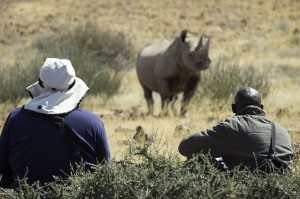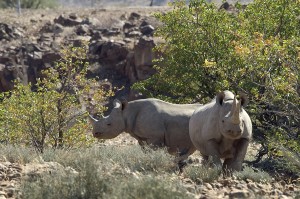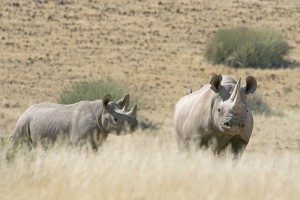 Situated within the 1.4 million-acre Palmwag Concession in Namibia’s remote and rugged north-west Kunene Region, Wilderness Safaris’ Desert Rhino Camp remains a prime example of how the private sector, NGOs and local communities can work together to ensure a future for Africa’s most threatened wildlife.
Situated within the 1.4 million-acre Palmwag Concession in Namibia’s remote and rugged north-west Kunene Region, Wilderness Safaris’ Desert Rhino Camp remains a prime example of how the private sector, NGOs and local communities can work together to ensure a future for Africa’s most threatened wildlife.
The camp, which opened in 2003, is a joint venture between Africa’s leading ecotourism company, Wilderness Safaris, conservation NGO Save the Rhino Trust (SRT) Namibia, and the local conservancies of Torra, Sesfontein and Anabeb. Guests have the opportunity to play a meaningful role in the ongoing preservation of the critically endangered rhino by tracking them on foot or by vehicle with SRT trackers. A portion of guests’ nightly rates directly funds black rhino monitoring and various other conservation activities in the region.
 “This collaboration has been instrumental in helping us achieve many conservation successes in this remote and harsh environment,” says Wilderness Safaris Group Conservation Manager, Kai Collins. Over the past three decades, the black rhino population has grown largely due to the combined efforts of the conservation communities, including Namibia’s Ministry of Environment and Tourism, SRT, IRDNC, WWF and NACSO, Traditional Authorities, local communities and private sector tourism.
“This collaboration has been instrumental in helping us achieve many conservation successes in this remote and harsh environment,” says Wilderness Safaris Group Conservation Manager, Kai Collins. Over the past three decades, the black rhino population has grown largely due to the combined efforts of the conservation communities, including Namibia’s Ministry of Environment and Tourism, SRT, IRDNC, WWF and NACSO, Traditional Authorities, local communities and private sector tourism.
North-west Namibia is home to the world’s last wild black rhino and the largest population of rhino on communal land with no formal conservation status. Unfortunately, after years of relative stability, external poaching pressures are mounting and threatening Namibia after nearly a two-decade poaching hiatus. The partnership between SRT, Wilderness Safaris Namibia, Wilderness Wildlife Trust and Anabeb, Sesfontein and Torra are addressing this threat, through their long-term collaborative approach that integrates rhino monitoring, tourism activities and community participation.
 “Awareness is key to protecting rhinos, and we believe that every guest at Desert Rhino Camp becomes a strong advocate for rhino conservation, joining us in the fight to protect the rhino,” said Simson Uri-Khob, CEO of SRT.
“Awareness is key to protecting rhinos, and we believe that every guest at Desert Rhino Camp becomes a strong advocate for rhino conservation, joining us in the fight to protect the rhino,” said Simson Uri-Khob, CEO of SRT.
“Over the last year, the threat to Namibia’s rhino has intensified, making it absolutely critical that we continue to strengthezn our presence and take decisive action against this increase in poaching in the sub-region. Together with our partners we will work tirelessly to stop poaching and ensure the ongoing survival of this species,” concludes Collins.
